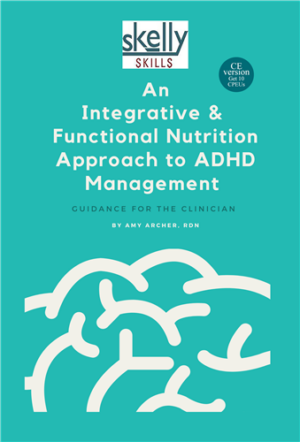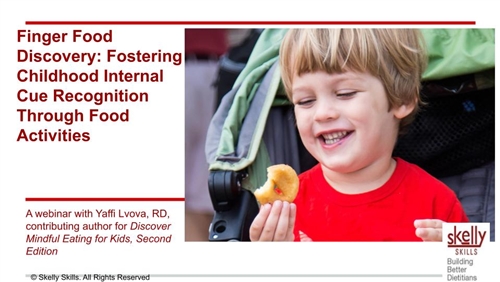

$20.00
On-demand Webinar! Enhance your tool set with a creative way to help your WIC clinic, Head Start program or school cafeteria optimize food acceptance in children. Learn more about the pediatric sensory challenges that many kids struggle with, and how to navigate them. Better understand sensory food play and how it serves as an effective and fun approach to expose children to different food and food textures. Boost your confidence in guiding your clients toward improved food acceptance through food play! Join us for a webinar with Yaffi Lvova, RDN, contributing author of Discover Mindful Eating for Kids, Second Edition and owner of Baby Bloom Nutrition. Dialogue will focus on working with kids aged 2-10.
BONUS! All attendees will receive a free Finger Paint Pudding activity handout from Discover Mindful Eating for Kids, Second Edition!
This webinar is CDR-approved for 1 CPEU for RD/RDNs and DTR/NDTRs, and CBDCE-approved for 1 CEU for CDCES’s.
Learn How Webinar CEs Work
CPEU/CEU: 1
Course Expiration Date--PLEASE NOTE EXPIRING SOON: 5/31/2024. You have until that date to complete your CPEU Evaluation or Webinar Feedback Survey for this course.
Course Type: 175 – Recorded Pre-Approved CPE
Includes Feedback Survey: Your CPEU/CEU certificate will be made available for you to download after completing the feedback survey. Link to survey is provided on Webinar page.
Suggested Learning Level: 1
On- demand Webinar! Learn how to guide caregivers in sensory food play incorporation for improved food acceptance!
Learning Objectives:
See the LNCs & PIs tab for suggested learning codes.
CPEU/CEU: 1 NOTE: Course Expiration Date--PLEASE NOTE EXPIRING SOON: 5/31/2024. You have until that date to complete your CPEU Evaluation or Webinar Feedback Survey for this course.
1.1.2 Pursues and embraces opportunities to advance practice.
1.1.3 Keeps abreast of changes in practice and in the practice environment that affect individual competence and legislative scope
of practice.
1.1.5 Integrates new knowledge and skills into practice.
1.1.8 Collaborates with others, seeks counsel and makes referrals as needed.
1.5.1 Builds rapport and trust within relationships while respecting professional boundaries.
1.7.1 Recognizes and respects cultural and racial diverse backgrounds to effectively interact and build meaningful relationships
with others (e.g., clients, employees, inter- and intra-professional team members and community and professional groups).
1.7.4 Implements strategies and creates culturally sensitive and diverse resources to support diverse populations.
2.1.1 Assesses the communication needs of individuals, groups and populations to provide effective communication.
2.1.3 Tailors messages and communication methods to meet the needs of target audiences.
2.1.5 Evaluates the effectiveness of communication methods used to ensure understanding of presented information.
2.2.1 Observes non-verbal and social cues and responds appropriately.
2.3.5 Collaborates with others when knowledge, skill or experience are beyond their competence level.
3.1.2 Fosters a culture in which diversity and cross-team collaboration is valued.
4.1.1 Demonstrates effective problem solving and professional judgment to address needs.
4.1.6 Recognizes situations where nutrition and dietetics service should be adjusted, limited, modified or discontinued.
4.2.1 Identifies potential or existing opportunities and challenges.
4.2.4 Investigates alternative explanations for deficits or challenges and considers alternative methods and provides justification for
selected option(s).
4.2.6 Integrates relevant information with previous learning, experience, professional knowledge, and current practice models.
6.8.4 Applies various theories and approaches to learning and education
7.2.2 Develops and provides education on safe food handling and sustainable practices to prevent and minimize contamination.
8.1.1 Interprets and applies evidence-based literature and standards for determining nutritional needs of target audiences.
8.1.2 Integrates knowledge of biological, physical, and social sciences with knowledge of food and nutrition to make decisions related
to nutrition care.
8.1.5 Demonstrates knowledge of nutrient requirements throughout the lifespan, and their role in health promotion and disease
prevention.
8.2.1 Engages in educational activities to maintain knowledge and to obtain new knowledge of diseases and clinical conditions.
8.2.2 Differentiates between outdated and current evidence-based practice related to the management of diseases and clinical
conditions
8.2.4 Integrates new knowledge of disease states and clinical conditions into practice.
8.3.4 Assesses clients’ emotions toward nutrition-related statements or phenomenon, body image/preoccupation with food and
weight, and readiness to change nutrition-related behaviors.
8.5.2 Develops or modifies recipes, menus, and meals using sensory perception and other food components.
8.5.3 Uses a variety of cooking techniques, food preparation methods and production and delivery systems.
8.5.4 Takes into consideration client/patient choices, beliefs, food sensitivities, allergies, and accessibility and affordability of food.
9.1.1 Demonstrates and applies age-appropriate education principles.
9.1.3 Identifies and analyzes factors that influence change in behaviors.
9.1.4 Evaluates factors that influence the learning process and skill building.
9.2.1 Evaluates learning needs of individuals and target groups.
9.2.2 Determines and takes into consideration the literacy and readability needs of individuals, groups and populations.
9.2.3 Applies educational theories and uses assessment results for planning process and development of materials and teaching aids.
9.2.4 Collaborates with learners and colleagues to formulate specific, measurable and attainable objectives and goals.
9.3.2 Develops a variety of learning activities based on a plan of action and the needs of individuals, groups, communities and populations.
9.3.3 Develops educational materials considering the client’s literacy, cognitive and physical functional levels to achieve objectives.
9.3.4 Takes into consideration the cultural needs of audiences and makes appropriate modifications to education materials.
9.3.5 Uses a variety of strategies to deliver education.
9.4.1 Takes into consideration special needs and disabilities and provides accommodations.
9.4.2 Assesses and identifies the current knowledge, skills, and cultural influences of populations.
9.4.3 Adjusts teaching plans and delivery to meet the needs of specified individuals, groups and populations.
9.4.4 Selects and uses appropriate content and teaching methods to meet individual and group needs.
9.4.5 Implements individualized teaching plans in order to promote, maintain and enhance nutritional health and learning.
9.5.1 Develops and uses evaluation instruments to assess education outcomes.
9.5.2 Obtains feedback on teaching style and content delivery methods used.
9.5.3 Analyzes and synthesizes collated data to recommend and make modifications to education and programs.
9.6.1 Assesses client/patient nutritional needs and appropriateness of the counseling.
9.6.2 Applies a variety of counseling theories, psychological methods and strategies that empower clients/patients to
make changes.
9.6.3 Applies counseling principles and evidence-based practice when providing individual or group sessions.
9.6.4 Identifies indications, contraindications, benefits, risks and limitations of counseling or behavior change therapy
9.6.5 Demonstrates an understanding of transference and countertransference in therapeutic relationships.
9.6.6 Determines client/patient expectations and aspirations and manages situations wherein these expectations cannot be
met.
9.6.8 Develops counseling or coaching goals in collaboration with clients.
9.6.9 Assists with resolution of barriers to achieving goals of counseling and coaching.
9.6.10 Evaluates the effectiveness of counseling or therapy and makes modifications as required.
9.6.11 Refers client/patient to appropriate professionals when counseling, therapy or mental health status is beyond
competence and legislative scope of practice.
10.2.10 Gathers and evaluates information related to behaviors, beliefs, knowledge, and client/patient attitudes that influence nutrition and
health.
10.2.12 Gathers information that affects intake and nutrition and health status (e.g., cultural, ethnic, religious, lifestyle influencers,
psychosocial, and social determinants of health).
10.3.1 Establishes goals and desired outcomes in collaboration with clients/patients.
10.3.2 Determines factors impacting client/patient progress in meeting goals and adjusts nutrition care plans accordingly.
10.3.9 Leads the implementation of nutrition interventions in collaboration with clients/patients and the interprofessional team.
10.5.1 Reevaluates and adjusts plans of care to support client/patient health goals.
10.5.3 Adjusts interventions based on client/patient progress in meeting established goals.
11.3.6 Demonstrates advanced communication, negotiation and leadership skills and flexibility with clients/patients, team and others.
Only logged in customers who have purchased this product may leave a review.
Skelly Skills is a provider of continuing education for dietitians (RD/RDNs), certified diabetes care and education specialists (CDCESs), registered nurses (RNs) and diet technicians, registered (DTR/NDTR). We provide CPE, (often called CEU, CE, and CPEU) for all of these groups, and all of our courses are approved for CE by the Commission on Dietetic Registration (CDR) and the CBDCE for CDCESs. Skelly Skills receives no commercial support and does not accept advertising or sponsorship of any kind.

CPEU/CEU: 10

CPEU/CEU: 29

CPEU/CEU: 1



Purchase your webinar and receive a link to the webinar immediately.
Watch your webinar and then submit the CE Feedback Survey form by the course expiration date.
After submitting your CE Feedback Survey, you will be able to download your CPEU/CEU certificate as a pdf and keep for your records.

We use cookies to ensure you get the best experience. By using our website or clicking "accept", you consent to cookies.
A. M., RDN, CD –
I can apply this to my own children and my WIC families!
M. Q., RD –
Presenter was knowledgeable and easy to follow along with, provided great tips that could be used by RDs in settings outside therapeutic settings as well.
T. M., RD, LD –
Very helpful! Refusal to try new foods is a common complaint from moms in our WIC program.
J. W., MS, RD, LD/N –
I really enjoyed this program. I loved how she is including new ways of thinking and how to interact with different populations.